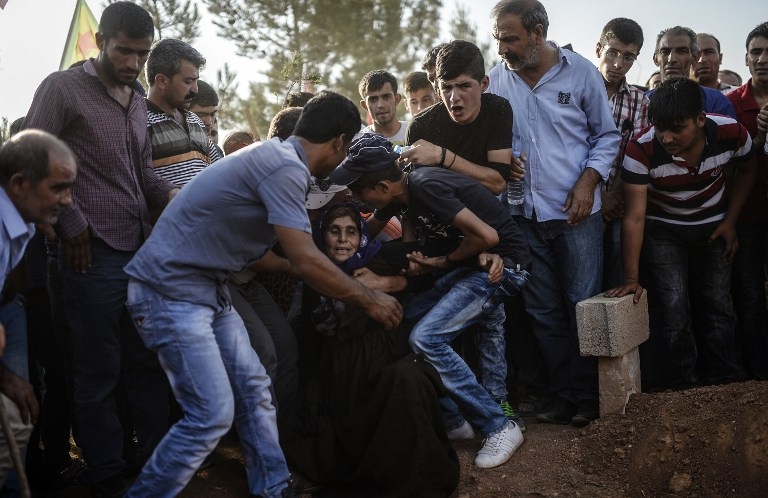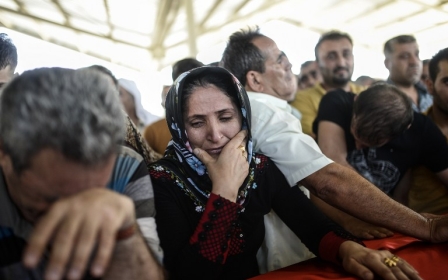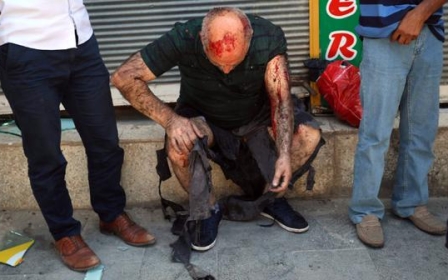ANALYSIS: Turkish response to Suruc attack tests Ankara’s IS stance

ISTANBUL, Turkey - The Turkish response to the terror attack in the border town of Suruc will potentially provide the strongest clue yet about whether Ankara is serious about changing its perceived stance of inaction against the Islamic State, or if it is simply paying lip service, analysts said.
A suspected suicide bomber of unknown gender from the Islamic State group blew themselves up on Monday in the town of Suruc, which is just across the border from the Syrian Kurdish town of Kobane. At least 32 youth activists - who were there to announce that they would be visiting Kobane to aid in reconstruction - were killed and more than 100 other people were injured. Almost 30 remain hospitalised and some remain in critical condition.
Condemnations of Monday's attack came swiftly but it remains to be seen whether it will prove the trigger for more intensive efforts against IS activities.
Back and forth
Hours after the attack, Turkish Prime Minister Ahmet Davutoglu called on all political parties to find common cause and issue a joint declaration condemning the attack. Initial findings indicated that IS was responsible, he added.
“We are faced with a terrorism incident. We have the willpower to find and punish those who are responsible,” Davutoglu said.
"For those who accuse our government of supporting Daesh [using an Arabic acronym for IS], I am telling them that Turkey was the first country to list Daesh as a terrorist organisation. It is a great irresponsibility to accuse the government and AK Party so soon after the incident,” he said.
Turkish President Recep Tayyip Erdogan, in televised remarks on Monday, also said that: “I condemn the perpetrators of this brutality both personally and in the name of my nation. Terror has to be condemned regardless of where it comes from.”
The leadership of the pro-Kurdish Peoples’ Democratic Party (HDP), however, was quick to issue a statement accusing the government of complicity, with protesters in Istanbul turning out to condemn Ankara’s IS policy.
“All countries and regimes from which ISIL [another term used to refer to IS] and similar armies of rapists receive support have a hand in this barbarity. The administrators in Ankara, who stay silent about ISIL but threaten the HDP every day while stroking ISIL on the head, are partners in this barbarity,” the statement said.
But the reality is not nearly so black and white.
With or against IS?
Long accused of turning a blind eye toward IS activities near its southern borders, there have been indications in recent weeks that Ankara might be willing to put its biggest fear - the formation of a Kurdish state south of its borders - to one side and actively start tackling issues that have been considered as strengthening IS, or at the very least allowing it more room to operate.
For Behlul Ozkan, an academic at Istanbul’s Marmara University, the core issue is Turkey’s problematic foreign policy vis-a-vis Syria.
“Turkey is aware that IS is growing stronger in both Syria and Turkey, but it is no longer sure how to respond given its positions since the Syrian conflict began. It does not in any way see the IS as a legitimate ruler in Syria,” he told Middle East Eye.
“Turkey considers both the PYD (Democratic Union Party), which is the PKK’s (Kurdistan Workers’ Party) Syrian wing, and IS as terrorist organisations. And contrary to the propaganda being spread, Turkey actually considers stopping IS from growing in strength and its spread as the more immediate priority,” said Ibrahim Kiras, a political commentator and columnist at Turkish newspaper Vatan.
“The strongest evidence of this is the support it provided to the PYD, albeit indirectly, at the time of the Kobane clashes," Kiras said.
Under international pressure to act, Turkey in late October allowed Kurdish Iraqi fighters to enter Kobane through its territory, a move which was later deemed to have at least partially helped turn the tide against IS.
According to Ozkan: “The Turkish government is facing a dilemma. It doesn’t know how many IS fighters there are in Turkey, or perhaps it does, but either way it fears serious repercussions if it launches an operation against IS, particularly if tourist areas are targeted.”
Turkey has big ambitions for its tourism sector, hoping to almost double the number of visitors by 2023 to some 60 million, in hopes of generating income worth $80bn, and would be loathe to see its vibrant tourism industry collapse due to regional upheaval.
Coalition hangs in balance
The coalition talks currently underway are also playing a role. Ozkan argues that heading a transitional government with the possibility of snap elections in November make it risky for the AKP-led government to launch an operation against IS at this point in time, especially if coalition talks fail to crystalise.
“If IS were to retaliate with an attack in a major Turkish city, it could have negative consequences for the AKP at the polls. It is difficult for transitional governments anywhere in the world to tackle such issues,” he said.
On the one hand, it has been argued that in case of snap elections, the AKP will be looking to win back the votes of conservative Kurds and liberal voters that it lost after taking a hard-line stance on the Kurdish peace process in the run-in to the 7 June general elections.
These groups might seem divergent, but both fear fresh influxes of Syrian refugees who have come to Turkey in droves due to its commendable open-door policy. The UN estimates put the number of Syrian refuges hosted by Turkey at approximately 1.8 million, but the number could be even higher.
But Ozkan believes there is no way that the AKP will be able to win back conservative Kurdish votes in the short-term at least, so he says that the policy will not be directed by potential elections, but by a real dilemma about how to go about tackling the growing IS threat.
The biggest indication that Ankara might be ready to change course with regard to IS came during talks earlier this month between Turkish officials and John Allen, the US special envoy on IS, where Turkey agreed to consider allowing the use of its territory for armed aerial action against IS.
Ozkan, however, believes that it is not a Kurdish state in northern Syria that Turkey fears but a PYD-led Kurdish state and this is what has hindered meaningful cooperation with the US in the fight against IS.
“It is a left wing, PYD-PKK state that Turkey fears, not a Kurdish state per se. We already have a quasi-Kurdish state in northern Iraq with which Turkey has very good relations. That is because [the President of the Iraqi Kurdish autonomous region Masoud] Barzani is a conservative with Islamic leanings and hence one of Turkey’s biggest allies in the region,” said Ozkan.
“Stretching all the way to Tunisia, Turkey has backed Islamic movements,” he added.
The claim that Turkey considers the PYD to be a bigger threat than IS is basically just PKK propaganda, Kiras explained.
“Both the PKK and the HDP, which is that organisation’s political wing, are attempting to turn the pain being experienced into an opportunity for themselves. The statements made after the Suruc massacre show this,” Kiras said.
Challenge of balance
After the bombing, Alan Semo, the UK-based representative of the PYD told MEE that the attack was “facilitated” by Turkey in its attempts to “destabilise” the Kurdish-majority regions.
Like many other critics, Semo has complained that Turkey is not doing enough to stop IS recruits crossing Turkey to join their forces in Syria. Semo has said the country made it relatively easy for IS members to pass back and forth across its porous border with Syria and remained a mere spectator last year as IS forces ransacked Kobane, just south of the border.
Turkey, on the other hand, has often lamented the lack of quick and effective intelligence sharing on the part of its Western allies and said that they should be doing more to stop potential militants from leaving Europe, the US and Australia to join IS.
Despite the back and forth, Turkey has taken more measures this year in an attempt to stem the flow of foreign fighters using its territory to join up with IS and al-Qaeda affiliated groups active in Syria.
Kiras told MEE that he believed the Kurdish political movement is trying to exploit this spillover into Turkey of the blood-filled conflict between the PYD and IS for control of northern Syria to consolidate its position here and is, therefore, accusing Turkey of complicity in the IS attack.
As the conflict next door continues to rage, the AKP’s current transitional government will have to tread a careful path and take measured decisions in order to avoid a repeat of the unrest that occurred in the country’s heavily Kurdish-populated regions in October 2014 after the fall of Kobane when at least 19 people were killed.
Erdogan and Davatoglu are also faced with the conundrum of keeping the Turkish borders open to innocent civilians fleeing the violence in Syria, while ensuring that IS and other armed factions do not exploit those same relatively open borders for their own purposes. The balance will continue to be a hard one to find.
New MEE newsletter: Jerusalem Dispatch
Sign up to get the latest insights and analysis on Israel-Palestine, alongside Turkey Unpacked and other MEE newsletters
Middle East Eye delivers independent and unrivalled coverage and analysis of the Middle East, North Africa and beyond. To learn more about republishing this content and the associated fees, please fill out this form. More about MEE can be found here.




